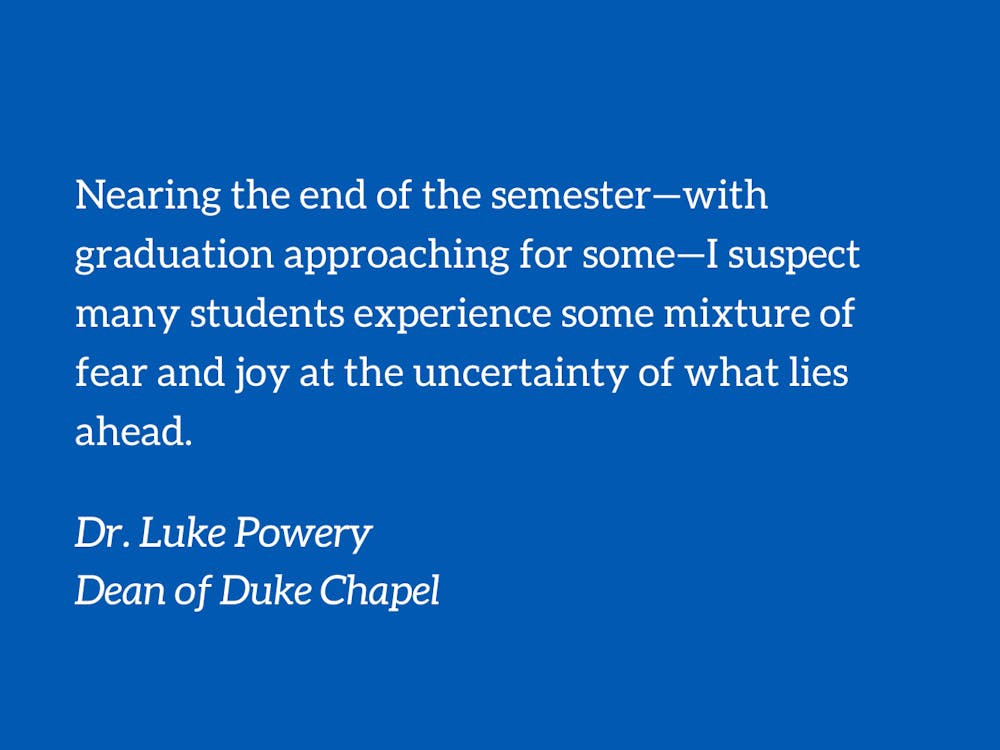Nearing the end of the semester—with graduation approaching for some—I suspect many students experience some mixture of fear and joy at the uncertainty of what lies ahead. This combination may seem odd, but the journey of life is odd. And maybe this is how it should be, for fear and joy aren’t always strangers—like when we fall in love or are expecting a baby or are about to enroll in a new graduate program in an unfamiliar state or country.
Having just celebrated Easter, I can tell you that you are in good company if you are experiencing both joy and fear. At the seminal event in the Christian faith, the resurrection of Jesus, two women are the first to find out about it when they come to Jesus’ tomb and find that its entrance stone has been rolled away. They encounter an angel who tells them that Jesus is not there because he has risen from the dead. “So they left the tomb quickly with fear and great joy” (Matthew 28:8a).
This is supposed to be good news, and you’d think that phobias would have been finished. But that’s not the case. Not even rolled-away stones can roll away human fear. These two women are filled with both “great joy” and “fear.”
The presence of fear with joy shows how joy is different from happiness. The two women had fear and “great joy”— not great happiness. That’s because happiness tends to be triggered by pleasurable external circumstances and is fleeting. We can feel happy when we receive a birthday gift, a teaching award, or win the lottery, or a certain team doesn’t make it into the NCAA tournament. Joy, on the other hand, is deeper than that, below the surface. In the face of the loss of a loved one or a bad health diagnosis or uncertainty about the future, you can still have joy. Joy is not based on your circumstances; joy is a gift.
This is why esteemed Princeton University religious historian Albert Raboteau could describe his spiritual journey as “a sorrowful joy.” Methodist scholar William McClain reminds us of the traditions of African American singing that reveal this dynamic as well:
“In our melancholy, our songs are not always mournful songs. Most often, they are joyous, lifting the spirit above despair. Yet, our sad songs sometimes come in the midst of our joy, in moments of jubilation and celebration. Without warning caution emerges to
remind us that songs of joy must be tempered by the stark realities of the plight of our people. In the midst of our joyful singing the soul has not forgotten depression, pain, and expressions of hopelessness on the face of our young. Laughter turns to tears and our glad songs into laments.
A keen example of this bifocality of Black musicality is shown in the spiritual, “Nobody Knows the Trouble I See.” The lyrics say, “Nobody knows the trouble I see… Glory, hallelujah!” It speaks to sorrow, and perhaps fear, with great joy.
So as another academic year ends, you may have great joy from your educational accomplishments, the friendships you have developed, and the memories you have made at Duke. And, you may also sense fear rising when you look to the future and wonder if you’ll land the right internship, if some relationships will last, and what kind of world you are entering when so many news headlines are bleak. This is part of life’s journey. It won’t always be happy, but may it be one of great joy.
The Rev. Dr. Luke A. Powery is Dean of Duke University Chapel. His column runs on alternate Mondays during the academic year.
Get The Chronicle straight to your inbox
Sign up for our weekly newsletter. Cancel at any time.

